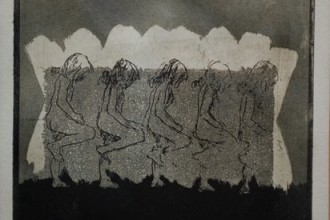In response to ‘Anne Whittle (alias chattox)’
It’s just about possible to place all poems somewhere on a spectrum stretching between sound and sense. At the ‘sound’ end of the spectrum, there are poems which (as Robert Lowell said of Dylan Thomas’s work) “can be enjoyed without understandingâ€, purely for the music of their lines. Towards the ‘sense’ end of the spectrum, we approach the disputed border between poetry and fiction: ‘sense’ poems foreground narrative over euphony.
Few readers would dispute that ‘Anne Whittle (alias chattox)’ foregrounds sound. Anne Whittle’s voice demands (and rewards) attention from her listener (and this is a poem that asks to be listened to, rather than merely read). The speaker gnaws at each word, turning the poem’s peculiar language over again and again to examine its taste and weight and texture, then spitting it back to the page.
This gnathic line of imagery recalls a detail of Anne Whittle’s confession, as preserved for posterity by Thomas Potts (‘The Wonderfull Discoverie of Witches in the Countie of Lancaster’). Whittle/chattox was one of the ‘Pendle witches’, nine of whom — seven women and two men —were executed by hanging in August 1612. Potts’ account describes how “the Deuill appeared vnto her in the liknes of a Man, about midnight†and demanded “that hee must haue one part of her body for him to sucke vpon.†Although she initially “refused to assentâ€, chattox soon yielded and gave permission for the Devil “to suck a place of her right side neere to her ribbes.â€
Keeping chattox’s confession in mind, the poem’s focus is understandably oral as well as aural. The reader is (vicariously) served a succession of dishes, with “a frumenty of venison†appearing first on the poem’s menu: frumenty derives from frumentum, the Latin for grain, and I’m indebted to Wikipedia for the knowledge that frumenty is paired with venison in at least two mediaeval English poems, ‘Wynnere and Wastoure’ and ‘The Alliterative Morte d’Arthur’.
“manchetâ€, in the following line, is white bread made with flour “of the highest qualityâ€: the kind of bread that Anne Whittle would perhaps have been prepared to sell a soul for.
Gradually beginning to feel slightly bloated, the reader moves via “marmalade of quince†and “a djug of custard sloshd… oevr goose and peacock, lamb nd potted beef†to “knash[ing] at th bare bakside/ of an apl… nd an appl & another/ apple.†The language itself starts to bloat: apple acquires an extra letter each time chattox (and the reader) return to “knash†at its exposed “baksideâ€.
The vividness of the poem’s language enables its reader-listener to enter the world of chattox, but it’s a world that feels — in many ways — profoundly unfamiliar. The past is, of course, “a foreign country: they do things differently there.†It follows, perhaps, that a poem which positions itself in the middle-distant past should not be afraid of doing things differently.
Think of the elderly patients in BS Johnson’s ‘House Mother Normal’, inhabiting a kind of post-linguistic parallel world, or the babbling, hiccupping Bazonge placing Gervaise into her coffin at the end of ‘L’Assommoir’. In both cases, the breakdown of language is associated with death and degradation. Anne Whittle, by the start of the poem’s second section, feels “only oldâ€, and her voice seems to slide inexorably into something approaching meaninglessness.
As rich and strange as the poem is, ‘Anne Whittle (alias chattox)’ isn’t quite sui generis. It has roots both in the early 17th-century and in the early 21st. Leo Mercer’s essay on post-internet ‘free spelling’ is a useful point of reference: Mercer cites HG Wells’ hope for “liberation [from the dungeons of a spelling-book]†and suggests that “‘Free spelling’ is one of the techniques that internet poetry is opening up for future poets to use as a matter of norm.†Liberation from the dungeons of the spelling-book may be more significant than any other idea behind the lines of ‘Anne Whittle (alias chattox)’: the poem is simultaneously an attempt to look back, finding connecting threads between the present and the life of a working-class (although the label may be anachronistic) woman in the early 1600s, and an attempt to move forward by liberating language and creating new possibilities for poetry.
Mercer’s essay asks whether a poet works “at the edges of language or at its beating heart?†‘Anne Whittle (alias chattox)’ demonstrates, perhaps, that it’s possible to do both.
~ Jacob Silkstone




